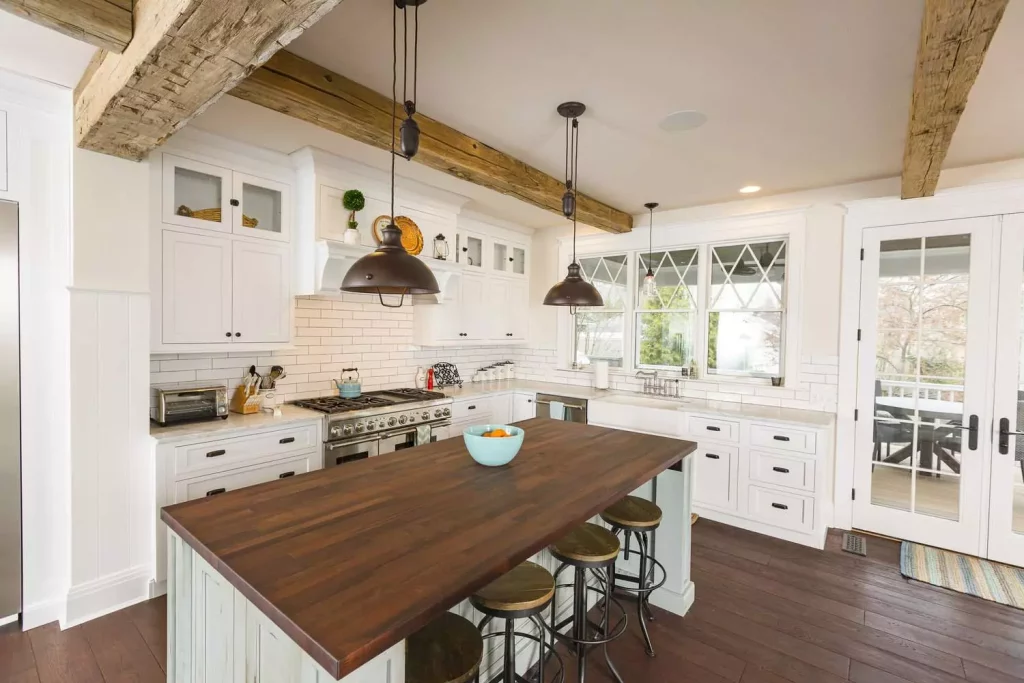Kitchen Renovation in Chichester:
Kitchen renovation in Chichester, a historic city in West Sussex, England, allows homeowners to transform their kitchen spaces to meet modern standards while preserving the charm of the area’s traditional architecture. The Kitchen renovation and refurbishment both involve improving and updating a kitchen space, but they differ in the extent of the changes and the project’s scope. Read below the differences between the two:
Kitchen Renovation:
Comprehensive Changes:
A kitchen renovation typically involves significant changes to the kitchen’s layout, design, and structure. This may include removing or relocating walls, changing the floor plan, and altering the electrical and plumbing systems.
Upgrade of Fixtures and Appliances:
In a renovation, there’s often a focus on upgrading fixtures (such as faucets and lighting) and appliances to more modern and efficient models. This can also involve installing new cabinetry and countertops.
Total Transformation:
Renovations aim to create a new, improved kitchen space. The goal is often to modernise and maximise functionality, including kitchen aesthetic changes.
Time and Cost:
Kitchen renovations are more time-consuming and costly than refurbishments. The scope of work involved often requires more extensive planning and construction.
Permits and Regulations:
Depending on the extent of the changes, kitchen renovations may require permits and adherence to building codes and regulations. This is especially true if structural modifications are involved.
Kitchen Refurbishment:
Cosmetic Improvements:
Kitchen refurbishment focuses primarily on cosmetic improvements rather than structural changes. It aims to refresh the kitchen’s appearance without significantly altering the layout or structure.
Surface Upgrades:
Refurbishment projects may involve refinishing or repainting cabinets, changing drawer and cabinet hardware, updating backsplashes, and applying a fresh coat of paint to walls and ceilings.
Minimal Disruption:
Since refurbishments don’t typically involve major structural work, they tend to be less disruptive to daily life than renovations. The kitchen can often remain functional throughout the process.
Budget-Friendly:
Kitchen refurbishments are generally more budget-friendly than renovations. They are an excellent option for homeowners looking to give their kitchen a facelift without a significant financial investment.
Shorter Timeline:
Refurbishment projects can often be completed more quickly than renovations since they don’t involve extensive construction work.
Here are five signs that indicate it’s time to consider remodeling your kitchen:
Outdated Design:
If your kitchen feels stuck in a bygone era with old-fashioned cabinets, outdated appliances, and a design that no longer suits your lifestyle or aesthetic preferences, it’s a clear sign that it’s time for a remodel. Modernising the design can make your kitchen more functional and visually appealing.
Lack of Functionality:
If your kitchen layout is inefficient, lacks adequate storage, or doesn’t provide enough counter space for meal preparation, it may be time for a remodel. Working in a kitchen that doesn’t meet your functional needs can be frustrating.
Wear and Tear:
Over time, kitchens can show signs of wear and tear, including damaged cabinets, chipped countertops, and outdated fixtures. If your kitchen’s materials deteriorate or show signs of age, a remodel can restore its functionality and aesthetics.
Safety Concerns:
Outdated electrical and plumbing systems can pose safety risks. If you notice issues like faulty wiring, leaking pipes, or gas line problems, it’s essential to address these concerns promptly through a kitchen remodel to ensure the safety of your home and family.
Increased Energy Costs:
Older kitchen appliances and lighting fixtures can be energy inefficient, leading to higher utility bills. Upgrading to energy-efficient appliances, lighting, and insulation during a remodel can reduce energy consumption and save money in the long run.
Additionally, consider your changing lifestyle and needs. If your family has grown or you’ve become an avid home cook, your kitchen may no longer meet your requirements, which is another sign that it’s time for a remodel.
Why is Kitchen Refurbishment important?
Kitchen Refurbishment Fareham is essential for several reasons, primarily centred around improving your kitchen space’s functionality, aesthetics, and overall quality. Here are some key reasons why kitchen refurbishment is essential:
Enhanced Functionality:
Refurbishing your kitchen allows you to make necessary adjustments to the layout and design, optimising the functionality of the space.
Improved Safety:
An ageing kitchen may have safety hazards like outdated electrical systems, malfunctioning appliances, or damaged countertops. Refurbishment provides an opportunity to address these issues, ensuring a safer environment for you and your family.
Increased Property Value:
A well-designed, up-to-date kitchen is a significant home selling point. Kitchen refurbishment can boost the resale value of your property, making it more attractive to potential buyers.
Enhanced Aesthetics:
Aesthetic improvements, such as new cabinets, countertops, flooring, and paint, can completely transform the look of your kitchen. This makes the space more visually appealing and creates a more pleasant atmosphere for cooking and dining.

